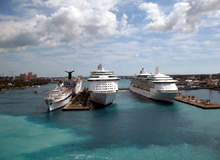
A fleet of wind-powered ships that suck up sea water, pump it up their funnels and blow mist into the sky to create a layer of protective clouds around the Earth’s surface has just been endorsed as an economical way to beat climate change. The Copenhagen Consensus Centre says the $9bn, 1,900-unmanned fleet could also reflect between 1% and 2% of all sunlight by simply criss-crossing the oceans and offsetting carbon emissions.
For today’s aging shipping fleet, beating climate change is not so easy. Since the ratification of the Kyoto Protocol in 1997 the International Maritime Organisation (IMO) was assigned to come up with practical measures that can stand alongside the carbon emissions reduction schemes most industries have to adhere to. 12 years on, and with a lack of any enforceable standard, industry watchers are beginning to wonder whether the IMO’s talk has just been hot (and polluting) air.
Empty words?
So far, the shipping industry has avoided the glare of scrutiny that has been afforded the aerospace industry. International shipping is responsible for 3% of global emissions, more than the total emitted by the UK or Canada, and if it continues to grow at today’s rate this figure could double by 2050.
Alongside the aerospace industry, shipping was left out of the Kyoto Protocol as it proved too hard to come up with simple emissions reduction targets. However, the fact that it is one of the fastest growing emitters was recognised and the IMO’s Marine Environment Protection Committee was tasked with producing a workable solution.
In July 2009, the Committee met to address the issue one final time before the crucial UN climate change conference in Copenhagen this December.
How well do you really know your competitors?
Access the most comprehensive Company Profiles on the market, powered by GlobalData. Save hours of research. Gain competitive edge.

Thank you!
Your download email will arrive shortly
Not ready to buy yet? Download a free sample
We are confident about the unique quality of our Company Profiles. However, we want you to make the most beneficial decision for your business, so we offer a free sample that you can download by submitting the below form
By GlobalDataMany environmental charities and non-governmental organisations that pushed for tangible measures for the industry to adhere to came away disappointed.
In short, the committee delayed a decision to raise the cost of ship fuel or implement mandatory guidelines. Instead, it agreed on technical measures that could be used to improve the efficiency of ship designs and improve efficiency in operations.
For WWF head of transport policy Peter Lockley, these measures don’t even scratch the surface of what must be done.
“The proposals are voluntary and they are not set at any level,” says Lockley. “It is not a measure with teeth at the moment. From our point of view, it is not much to show from being in charge of this issue for the 12 years since the Kyoto Protocol.”
Progress for some
Shipping giant AP Moller-Maersk recently won the sustainable shipping operator of the year award by the Petromedia Group. It was praised for the way it challenged conventional wisdom by proving that container ships can save fuel by sailing much slower than traditionally recommended. For Maersk director of regulatory affairs Robert Pedersen, the meeting outcomes were positive.
“Progress was made on all aspects of the comprehensive regulatory package that the IMO is working on to address greenhouse gas emissions from international shipping,” he says.
But even he is keenly aware that the conclusions have not pleased all parties.
“I am aware that some might have wished for a final regulatory package to be approved and adopted already by now, but for obvious reasons many countries are reluctant to show flexibility before [Copenhagen],” he says.
A report produced by the IMO, presented two months before the crucial July meeting, found the shipping industry could reduce a fifth of its emissions at a financial benefit to the industry, but frustratingly for environmentalists, nothing has been done about it. The Second IMO GHG Study 2009 said that installing fuel-efficient technologies could result in a reduction of an estimated 255 million tonnes of carbon dioxide.
“There is a range of measures where the cost efficiency is negative,” the report said. “That means that these are profitable even when CO2 emissions have no price.”
No mandate was made to install these measures and Lockley says that the reluctance to invest in them stems from the up-front cost they represent. In addition, the fragmented nature of the industry means that the benefits may not be felt by those who make the initial spend.
“I think it is to do with the fact that it is quite a complex and fragmented industry,’ he adds. “The person paying the fuel bill isn’t necessarily the person who makes decisions about equipping the fleet.”







